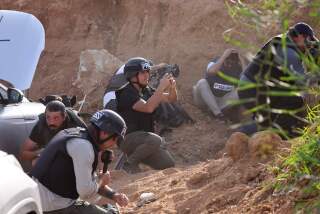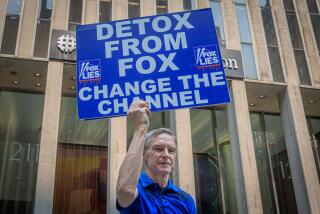Meese Suggests Media Code for Governing News Coverage During Actions by Terrorists
- Share via
LONDON — In the wake of the controversy surrounding television’s role in the recent 16-day hijacking of a TWA airliner to Beirut, U.S. Atty. Gen. Edwin Meese III on Wednesday suggested a possible written code of conduct to govern media coverage during a prolonged terrorist attack.
Speaking at a news conference in connection with a weeklong convention of the American Bar Assn. here, Meese said the code could take the form of an agreement between the press and law-enforcement agencies. He said that it could “possibly delay the release of information or even withhold some interviews that might be dangerous or endanger the successful conclusion of the operation.”
Meese indicated that the government might take the initiative and approach news organizations to determine what kind of agreement could be negotiated. However, he ruled out any attempt to legislate such a code and stressed that it could only be based on mutual good will between the government and the media.
‘A Better Job Together’
“It is important that we not do anything that interferes with the ability of the press to speak out and inform the public, but I think there are areas where the press itself is not only willing but anxious to cooperate,” he said. “On the basis of good will, we can cooperate to see how we can do a better job together.”
The attorney general’s remarks followed a major address by Prime Minister Margaret Thatcher to the same ABA convention on Monday, when she called for ways to “starve the terrorist and hijacker of the oxygen of publicity on which they depend.”
Live interviews and press conferences with the Arab terrorists and their American hostages carried by American television during the 16-day hijacking in June have raised serious questions, both within the U.S. government and among news organizations about how to deal with such events.
Meese declined to pass judgment on television coverage of the hijacking, saying that it would have to be closely analyzed to determine if specific news conferences or interviews were harmful or helpful in resolving the crisis.
‘80 London Siege Cited
He cited media agreement in Britain to withhold publication of sensitive information during the 1980 siege of the Iranian Embassy in London as an example of how a code of conduct might work. In that incident, a British anti-terrorist squad stormed the embassy and freed the hostages.
“The press was very careful not to do things that interfered with the police operation,” Meese noted. “In return, the police gave them full information they could use later on.”
He also noted that in the United States, the press and the police have previously cooperated in kidnapings and in other cases where the release of certain critical information that might have helped criminals was delayed.
More to Read
Sign up for Essential California
The most important California stories and recommendations in your inbox every morning.
You may occasionally receive promotional content from the Los Angeles Times.













